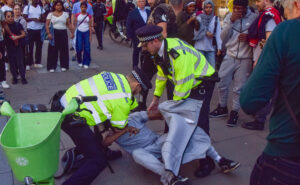My small Shires market town reported a handful of crimes a year when we moved here a decade ago. Over the past year or so, every garage on my street has been burgled. Only last week an escaping shoplifter shoved my daughter to the ground while fleeing the local Londis. Police don’t even attend when you report incidents. The area has not seen a decline in prosperity — only in civic orderliness. And it’s a vicious cycle that burns out local civic participation. I know one town councillor who joined full of enthusiasm, only to resign a year later when officials suggested that, as there was no prospect of any police response to rising drug-taking and antisocial behaviour in the local park, maybe he and another councillor should themselves form a citizen patrol.
The aggregate feeling of having been left by our leaders to rot amid a disintegrating social contract is not a confection of the Right-wing press. It’s a mutinous consequence of visible deterioration. It’s echoed across the media, with reports coming thick and fast of a nationwide shoplifting epidemic, and a documented rise in petty destructiveness such as vandalising shops and restaurants, monuments, or hire bikes. Is this just cuts, or the cost of living? Racism, perhaps? Not enough youth clubs? The causes of crime are complex; but when TikTok is full of video content from across the Anglosphere, in which people — usually young women — boast about their “borrowing haul”, the suspicion arises that some at least are breaking the law simply because it’s fun, and because no one is stopping them.
As we shamble toward a General Election next year, I suspect all prizes will go to whichever politician manages to convince the electorate of their ability to reverse this sense of pervasive decay. But this will be difficult, for it requires us to confront a central cognitive dissonance. That is: the delusion that we can enjoy low-touch policing, alongside the pluralism and rebelliousness that run through post-Sixties Anglophone culture like letters through a stick of seaside rock. For while economics, policing strategy, sentencing policy and the like no doubt have a part to play in crime rates, these beliefs do as well. And together they have chipped away our social order.
For some decades now, Britain has turned away from strong social norms toward pluralistic values and a celebration of the individual. It is received opinion now that the right to be individualistic and even contrarian improves both individual happiness and also the overall social fabric. These beliefs underpin countless platitudes: “Everyone’s different”; “Just be you”; “Each to his own”; or indeed “Diversity is our strength.” Any contemporary reflections on the contribution shared values make to public safety tend to disintegrate into bitter arguments over this last: “diversity”. Which is to say immigration. Over the past week, Home Secretary Suella Braverman reignited that bin-fire, drawing fury from progressives and her own side alike for speeches that framed both the pluralistic values implied by multiculturalism and also mass immigration itself as risks to public safety.
But this has it at least partly backwards. We embrace literal diversity at least in part because we set such stock by pluralism, and so little by shared values. Only a polity that so values letting everyone do their thing and denies any need for such things as shared social norms would fail to anticipate that political and cultural clashes may arise when you fail to integrate culturally distinct sub-populations. In this sense, the immigration debate is only one particularly ugly subset of a wider question that implicates us all. For while we left social conformity behind long ago — some time ahead of the recent rise in immigration, in fact — we stayed committed to a low-touch policing model that relied on that conformity.
Then, having entrenched pluralism and personal freedom as sacred values, we’re left with a conundrum: how are we to respond to those whose values are so divergent from the mainstream that they exercise their freedom by disrupting the status quo for fun, in ways that make things worse for everyone? Our sacred values make it politically difficult to respond with a strong-arm approach. Quite the opposite: activists respond to such behaviour not with calls for stronger policing but for an even less of it.
In the vacuum this produces, the response to hobby lawlessness we appear to be converging on, by default, is a kind of weary acceptance that there’s nothing that can be done — for doing so would mean attacking personal freedom or values such as pluralism, or calling for (gasp) “authoritarian” policing. Outside the liberal West, states such as Dubai and Singapore solve the equation quite differently. Both these states are pluralistic: in Dubai, nationals comprise only around 15% of the population, while Singapore’s population is around 40% immigrant. And yet both have low crime levels — because leaders in these geographies are considerably less troubled than we are by heavy-handed policing. Dubai retains the death penalty for crimes such as murder, treason, and espionage, for example, while Singapore hangs drug dealers on a regular basis.
It’s possible, then, that the most direct way of achieving a society that’s both multicultural (albeit unhappily so) and low-crime is through brutally authoritarian policing. To date, though, Britain’s tradition of liberalism has rendered this an unappealing prospect — at least for those who make British law. Could this change? Well, I suspect any British politician who delivered Singapore-like levels of public safety would be popular with the British electorate — even if this came at the overall cost of less cuddly policing.
But there’s a marked class divergence on this issue. This becomes visible if we take the death penalty as a crude proxy for an authoritarian stance on public safety: a 2022 poll showed considerably greater support for the measure in the C2DE (working and lower middle-class) bracket (49%) than the 35% of ABC1 (middle and upper class) voters who support capital punishment. Rage and desperation, though, can drive support for stern measures: a recent survey suggested six in 10 voters supported reinstating it.
Meanwhile, in another non-Western polity, the autocratic measures taken by El Salvador’s leader Nayib Bukele to crack down on criminal gangs have both shocked Western advocates of civil liberties and democratic norms, and so drastically reduced the murder rate as to deliver a reported 93% approval rate among Salvadoreans. I doubt Britain will go full Bukele any time soon. But rampant crime cuts through across the electorate like nothing else; I and probably most of my town will most likely vote, next year, for the political party that advances the most convincing strategy for ending the epidemic of petty crime.
I suspect, though, that doing so will mean looking again at our long-cherished trifecta of pluralism, individualism, and light-touch policing. For if we want space to be contrarian, alongside light-touch policing, that’s going to mean less pluralism. Such a settlement won’t function under the thin shared belief that we don’t need common values. In turn, this would probably mean heeding the warnings of Braverman and her ilk, and making more concerted efforts to slow the pace of demographic change, so a sufficiently robust baseline of shared social norms can emerge in order that public life can once again largely police itself. It’s a long shot. So perhaps instead we could opt for pluralism plus light-touch policing. Then we’ll have to accept that this comes with a clampdown on freedom of conscience. In other words: the soft tyranny of “nudge unit” style nanny-statism, employed by leaders terrified of direct authority, in an effort to manipulate everyone into good behaviour. (Some might argue we’re a good distance down this road already.)
Conversely, a polity that allows both freedom of conscience and pluralism can only be kept from spinning out of control by far tougher law enforcement than we’re accustomed to in Britain. Values pluralism is a done deal in this country, for now; if we can’t bear to let go of our contrarianism with that change, the only way we’ll enjoy low crime levels as well is with law enforcement that more closely resembles Dubai or Singapore than the traditional British bobby.
What about those who insist that there’s no need to choose? Maybe there’s still some way we can have personal freedom, anything-goes values pluralism, and a police force more interested in dancing at carnivals than arresting persistent criminals? Well, yes, there is. And if we take this route, nothing immediate will happen. Over time, though, this public-safety cakeism will also deliver an ongoing acceleration of every contemporary trend that’s currently making life measurably worse for everyone, everywhere in the country.
That is: unsafe streets, mounding litter, smashed public amenities, rampant petty criminality, and a steady drain of public-spirited people from civic participation. It will mean, in a word, the end of civic life. If that’s not the country we want to be, we’re going to have to stop pretending we can have it all.
Disclaimer
Some of the posts we share are controversial and we do not necessarily agree with them in the whole extend. Sometimes we agree with the content or part of it but we do not agree with the narration or language. Nevertheless we find them somehow interesting, valuable and/or informative or we share them, because we strongly believe in freedom of speech, free press and journalism. We strongly encourage you to have a critical approach to all the content, do your own research and analysis to build your own opinion.
We would be glad to have your feedback.
Source: UnHerd Read the original article here: https://unherd.com/



